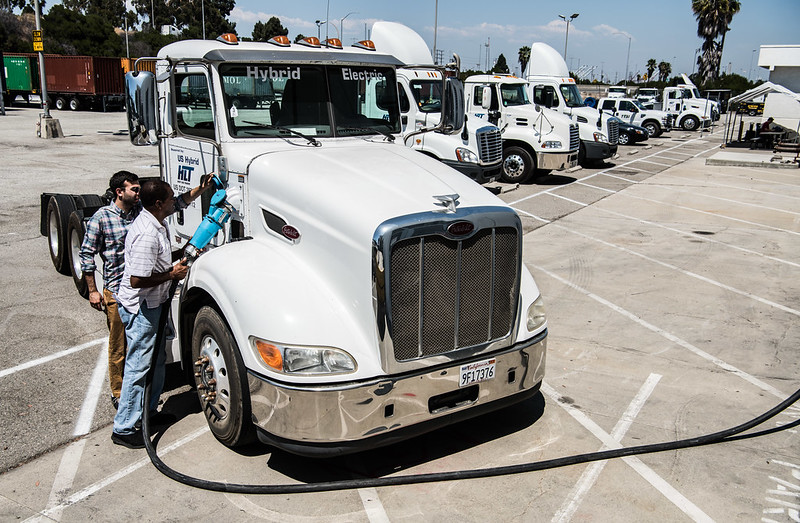This week Congressional Democrats in the U.S. House of Representatives put forward policies, including passing a $1.5 trillion infrastructure bill on July 1, aimed at cleaning up the number one source of carbon pollution in America — the transportation sector. The oil and gas industry and its supporters quickly weighed in, framing “the critical role” of the industry in addressing climate pollution and in some cases outright attacking these plans’ efforts to move away from petroleum-powered transport.
The infrastructure bill comes on the heels of a new climate action plan released June 30 by the House Select Committee on the Climate Crisis. That plan offers a roadmap for mostly eliminating globe-warming greenhouse gas emissions from the U.S. by 2050. Achieving zero emissions from the nation’s transportation sector is a key priority in this plan.
“When anyone talks about addressing the climate crisis, you cannot do so without addressing the transportation sector,” Rep. Julia Brownley (D-CA), a member of the House Select Committee on the Climate Crisis and the House Transportation and Infrastructure Committee, said at June 30 press conference announcing the new climate plan.
The @ClimateCrisis Select Committee just unveiled the comprehensive #ClimateCrisisActionPlan to overhaul America’s lacking response to the Climate Crisis. I am proud that several of my bills are included in this plan. Read the report here: https://t.co/lKcUiHQ7nB
— Congresswoman Julia Brownley (@RepBrownley) July 1, 2020
The transportation section of the 500-plus-page plan covers a range of priorities such as investing in electric vehicle charging infrastructure, extending the tax credit for electric vehicles, and implementing stringent fuel efficiency standards for conventional vehicles. And just as the overall plan has a goal of net-zero emissions economy-wide by 2050, its transportation portion calls for eliminating emissions from cars and trucks. Specifically, all vehicles sold in the U.S. should be zero-emission by 2035 for cars, and by 2040 for heavy-duty trucks.
It is the first time a body in Congress has set a deadline for selling 100 percent zero-emission vehicles, which include electric or fuel cell cars. Over a dozen countries have already set timetables for phasing out conventional petroleum-powered vehicles.
Following California’s lead, some states in the U.S. are adopting zero-emission vehicle standards, in order to boost the number of cars sold in their borders that avoid spewing carbon and other harmful air pollution. California also recently announced a first-in-the-nation rule for the state to sell only zero-emission (essentially, electric) trucks by 2045.
Electrifying the transportation system is seen as a key strategy for slashing emissions, since electric vehicles do not have a tailpipe and are powered by electricity that is increasingly becoming cleaner. Studies have shown that electric vehicles are less emissions–intensive over their lifetimes than conventional, internal combustion engine (ICE) vehicles powered by petroleum products like gasoline and diesel. Cleaning up long-haul truck emissions has another major benefit: protecting lower-income communities of color that bear the burden of health impacts from vehicle pollution.
Oil Industry Groups Respond
The chances that the infrastructure package and many other policies outlined in the Democrats’ climate plan will become law under the Republican-controlled Senate and President Donald Trump are very slim to none. According to The Hill, Trump slammed the infrastructure package as “full of wasteful ‘Green New Deal’ initiatives” and Senate Majority Leader Mitch McConnell (R-KY) called it “nonsense.” Both Trump and McConnell receive sizable campaign contributions from the fossil fuel industry, according to OpenSecrets.org.
Oil industry trade associations and front groups funded by the oil and gas industry are already coming out against the Democrats’ climate plan and infrastructure package.
The American Petroleum Institute (API) — the largest trade association for the U.S. oil and gas industry — issued a statement on the House Democrats’ climate plan that champions the petroleum sector as committed to reducing greenhouse gas emissions and “meeting this [climate] challenge head on.” The statement ignores the oil and gas industry’s historical and ongoing contribution to the climate crisis.
API was recently named a defendant in a climate lawsuit filed last week by Minnesota Attorney General Keith Ellison. The suit alleges that a 30-year campaign of deception (and denial and delay) by the oil industry played a major role in transforming climate change from a problem to a global crisis.
The American Energy Alliance, another group representing the interests of oil and gas and run by a former Koch Industries lobbyist, sharply criticized the House Democrats’ infrastructure package, falsely claiming that Americans are unconcerned about climate change and that electric vehicles and renewable energy are “failed products and inadequate energy sources.” In recent years, the group has repeatedly released misleading and biased opinion polls on electric cars and fuel efficiency standards.
However, recent polling from the Pew Research Center shows that two-thirds of Americans think the government should do more to address climate change. According to that polling, an overwhelming majority of Americans, 79 percent, say a priority should be developing alternative, cleaner energy sources like wind and solar. And a recent study by the University of California, Berkeley showed that 90 percent of the United States could be powered by 100 percent renewable energy by 2035.
Yet another group criticizing House Democrats’ climate and transportation proposals is the Transportation Fairness Alliance, which DeSmog recently revealed is a coalition representing major oil and farming interests that stand to lose profits from the transition away from transportation powered by gasoline, which includes ethanol derived from corn.
Despite claims of “diversity” and “equity,” the Transportation Fairness Alliance is comprised mainly of #oil and #gas trade associations with a vested interest in maintaining the #petroleum-dependent transportation system status quo. https://t.co/InnoajvsLH
— DeSmogBlog (@DeSmogBlog) June 22, 2020
In a new blog post, the Transportation Fairness Alliance (TFA) attacks the proposal to transition to 100 percent zero-emission vehicles by 2035, claiming it “overlooks scientific data.” TFA argues that electric vehicles are not that clean and that the government should not be “banning” conventional vehicles. However, scientific data from the UN‘s Intergovernmental Panel on Climate Change shows that conventional vehicles are driving global warming emissions in a significant way, and many parts of the world are already planning to ditch petroleum-powered transportation in the decades ahead.
“Cars and trucks powered by fossil fuels must be relegated to the history books,” Morgan Folger, Destination: Zero Carbon Campaign Director for Environment America, said in a statement supporting the House Democrats’ climate plan. “By calling for 100 percent zero-emission car sales by 2035 and zero-emission heavy-duty trucks by 2040, the [House] select committee would put America on a path to cleaner, healthier transportation.”
Scaling up Electric Vehicles
The U.S. has over a million electric vehicles (EV) on its roads. The House Democrats’ new climate plan outlines several initiatives to scale up that number. Some highlights include the following:
Establishing a national zero-emission vehicle (ZEV) standard.
All light-duty vehicles sold by 2035 must be zero-emission, which could include electric cars, hydrogen fuel cell vehicles, or other potential zero-emissions technologies. For medium and heavy-duty vehicles like trucks, at least 30 percent of these vehicles should be zero-emission by 2030, and by 2040 all vehicles must meet that standard.
Extending the electric vehicle tax credit.
The consumer tax credit, which provides up to $7,500 towards the purchase or lease of an EV, has a cap; when the manufacturer sells more than 200,000 qualifying vehicles, the tax credit phases out. Several EV manufacturers — Tesla and GM — have already reached that cap. The new climate plan also calls for raising the cap to support widespread EV deployment and recommends enacting a tax incentive or grant program to encourage purchasing used EVs.
Supporting EV charging infrastructure.
In this plan, House Democrats call out the importance of federal funding in supporting the build-out of electric vehicle charging stations. One priority for deciding who receives this funding is establishing a competitive grant program. The U.S. Department of Transportation would then be able to issue grants to state and local governments and other organizations to install public charging stations.
Setting up a used-car trade-in program to speed adoption of EVs.
Last fall Sen. Chuck Schumer (D-NY) led a proposal called Clean Cars for America that included a trade-in rebate program to incentivize consumers to replace their older gas-powered cars with cleaner zero-emission vehicles. The program is modeled after the Cash for Clunkers stimulus initiative implemented in the wake of the 2008-era economic recession. The House Democrats’ climate plan recommends Schumer’s proposal to create a similar trade-in program that would help accelerate the adoption of electric vehicles.
House Infrastructure Package Prioritizes Clean Transportation
The House Democrats’ climate action plan includes many other transportation initiatives, such as policy recommendations for cleaning up climate pollution from aviation, rail travel, and shipping. It proposes doubling federal funding for public transit and supporting community programs like car-free zones that encourage walking and biking.
It also recommends preparing America’s transportation system for long-term climate resilience, or in other words, making infrastructure like roads and airport runways better able to withstand climate-related impacts like extreme flooding and sea level rise.
Many of these policy recommendations are included in the Moving Forward Act, a $1.5 trillion legislative package on infrastructure improvements that the House passed by a 233-to-188 margin on July 1.
That package includes a transportation-focused bill called the INVEST in America Act. This bill lays out a nearly $500 billion investment aimed at “putting the U.S. on a path toward zero emissions from the transportation sector by cutting carbon pollution, investing in public transit and the national rail network, building out fueling infrastructure for low- and zero-emission vehicles, and deploying technology and innovative materials,” according to a news release on the bill.
JUST IN: @HouseDemocrats pass the #MovingForward Act.
This bill is about taking action & reclaiming our future to create a better tomorrow. It’s about taking on climate change, rebuilding our nation, & focusing on equity. It’s about creating real & lasting change #ForThePeople. pic.twitter.com/gJrBokNzxp
— Committee on Transportation and Infrastructure (@TransportDems) July 1, 2020
As Congresswoman Brownley described it at the June 30 press conference on the climate plan, this infrastructure package and its transportation bill are “the most comprehensive look at the transportation sector with respect to the climate crisis in the history of Congress.”
Main image: Hybrid electric heavy-duty truck is charged in California. Credit: Dennis Schroeder/NREL, CC BY–NC–SA 2.0
Subscribe to our newsletter
Stay up to date with DeSmog news and alerts






